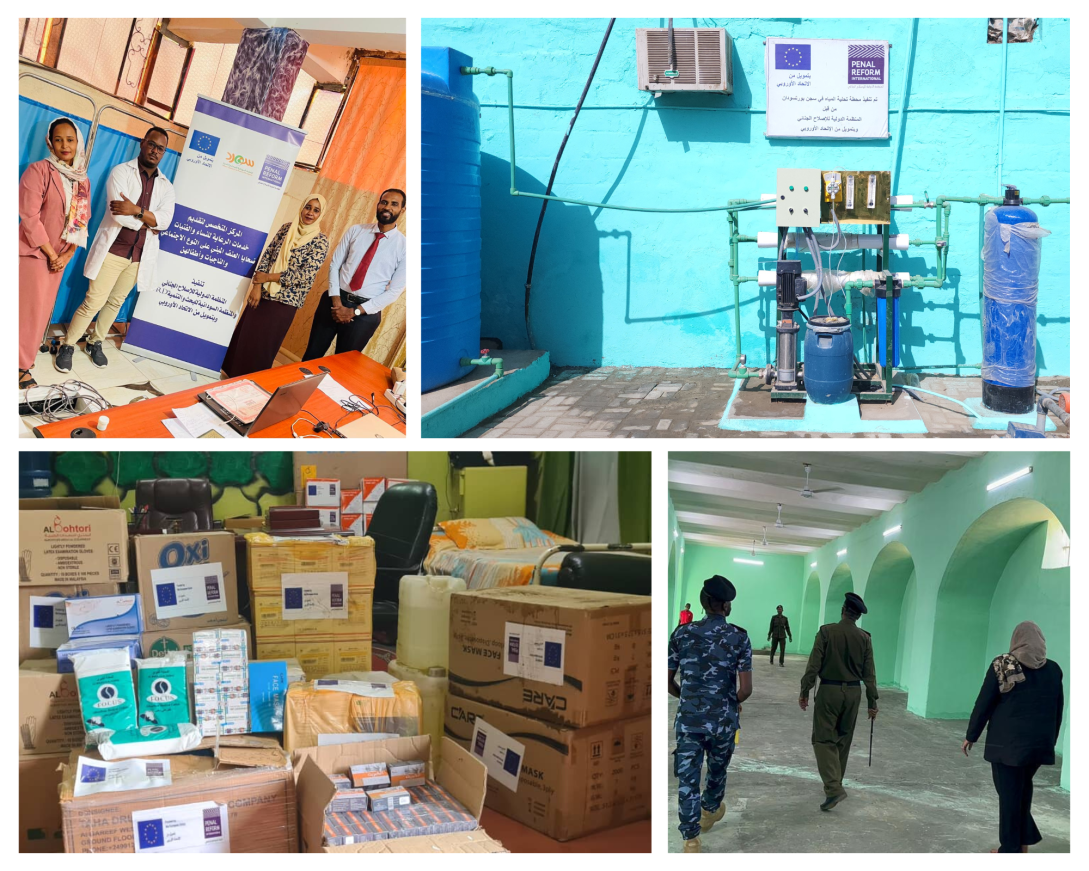The challenges to guarantee human conditions in prisons in Sudan

The ongoing conflict in Sudan has exacerbated the already dire conditions of prisoners in the country. Massive displacements, resources scarcity, breakdown of governance systems and destruction of infrastructures have severely impacted the prison system. As more areas have become conflict zones, the ability of authorities to maintain prison standards has diminished. This results in worsening conditions of overcrowding as more individuals are detained, often without due process.
The conflict has also led to poorer nutrition and health status of the prisoners and has diverted government attention and resources away from essential reforms and humanitarian interventions needed in detention facilities.
To diminish these challenges, a 3-year project, funded by the European Union, is implemented by Penal Reform International since June 2023, with the objective to improve the living conditions of women, children and young prisoners. The initiative covers six states of the country and aims at enhancing the rule of law by promoting access to justice while increasing gender equality and human rights of those in detention. The project targets 8,000 individuals who remained in the system throughout the war.
One of the most urgent challenges underlined in the 2021 report by PRI was the situation of children living with their mothers in prisons. 156 children were with their mothers in all prisons in Sudan at the time of the study (60 in the assessed prisons) and had no access to basics such as milk and diapers.
Basic services but not only
Rehabilitation of infrastructures, including dormitories, toilets, health clinics, kitchens, sewage system and providing clean drinking water in Wad Madani prison, Port Sudan and at Kassala prison have been some of the activities conducted in the first year of the Project. Additionally, the creation of units for around 24 children staying at prisons with their mothers has been part of the operations.
However, a holistic approach is needed to enhance the support to those women. To achieve this, a one-stop centre that provides legal support, mental health and referral services for women victims of gender-based violence in Kassala was created and a psychological support programme for women in Port Sudan prisons started.
A help line will be operational in the second year of the project to provide legal assistance services for women victims of GBV, the poor and most vulnerable. Legal aid offices inside prisons to support the releasing of women and young prisoners are also under establishment. “Our legal aid scheme is designed to assist everyone who cannot afford legal representation, with a particular focus on supporting the impoverished,” explains Taghreed Jaber, PRI Regional Director for MENA region.
Remarkable achievements of Penal Reform International under this initiative were to control a cholera outbreak in Madani prison in November 2023, thus saving the lives of 700 prisoners and the prison staff, and to terminate the refurbishment of the women prison just before the advancement of the conflict to this area in December 2023.
At present “a farm is under development at Kassala prison, with the aim at planting 20 acres with tomato, onion, pepper, chilli pepper, eggplant with the aim of using it as vocational programme for prisoners and secure food and respond to the famine humanitarian crisis threatening Sudan”, states the PRI Regional Director. By doing so more than 2000 people, including prisoners, prison staff and their families and members of the surrounding community of IDPs will have access to food as part of this initiative.
A gender-based approach
The fact that women constitute a minority within the prison population in Sudan has significant implications for the services provided to them, leading to increased discrimination and neglect. “Being outnumbered, the specific needs of women often receive less attention in policy planning and resource allocation, resulting in facilities and programmes that are primarily designed for the majority male population,” explains Taghreed Jaber.
These conditions have several implications: the lack of gender-specific healthcare, including gynaecological and prenatal care, insufficient protection against gender-based violence within prisons, or absence of rehabilitation and vocational training programmes. These are especially crucial for reintegration of women detainees as it does not only affect their incarceration conditions but also hampers their rehabilitation and prospects for reintegration into their communities.
As the team at Penal Reform International underlines, “In times of conflict, the most vulnerable often suffer the most. Prisons are no exception. Supporting prison systems during conflicts ensures the protection of human rights, prevents further humanitarian crises, and promotes stability and justice. Let's not forget those behind bars — their well-being is a measure of our humanity.”





